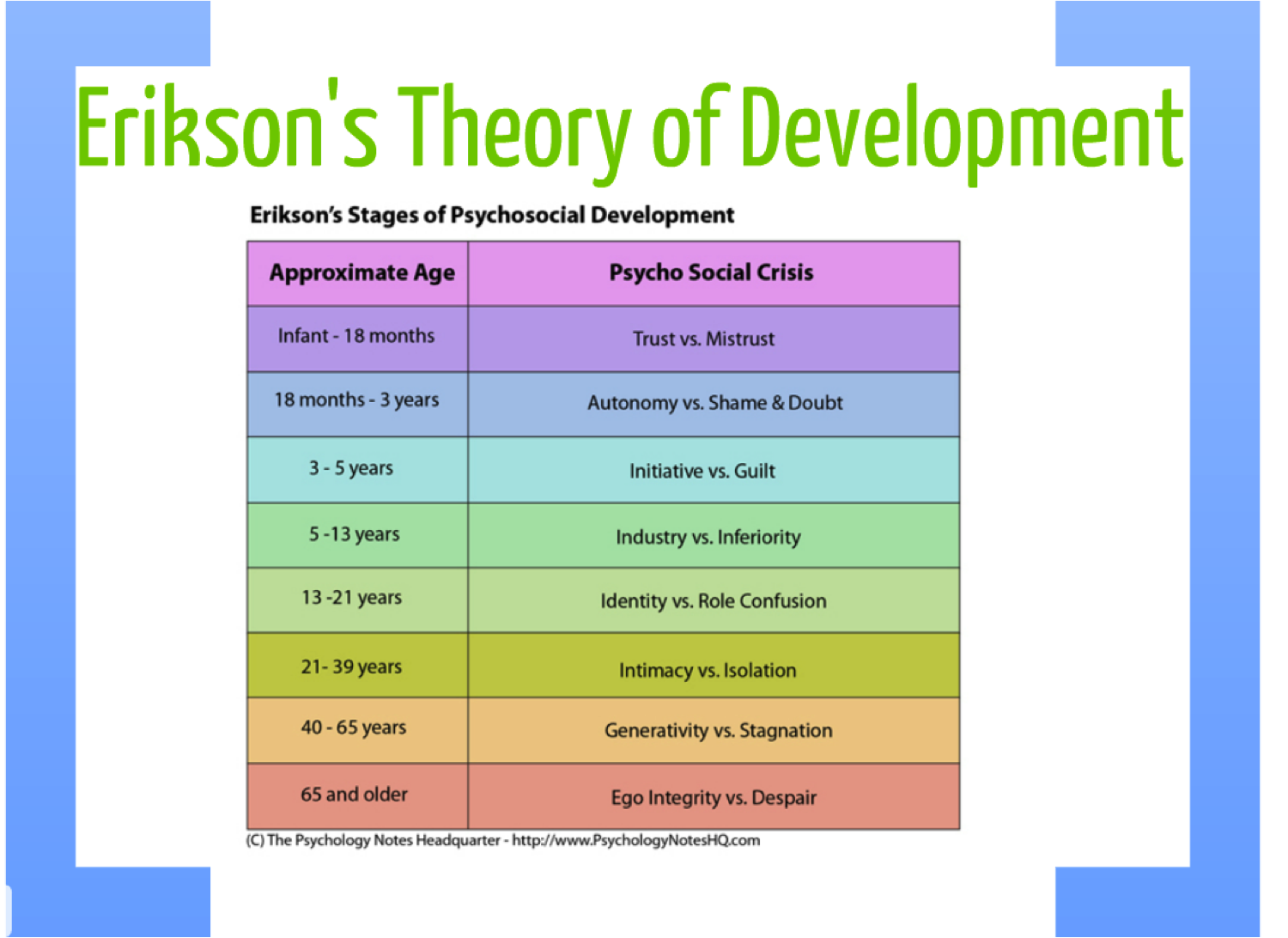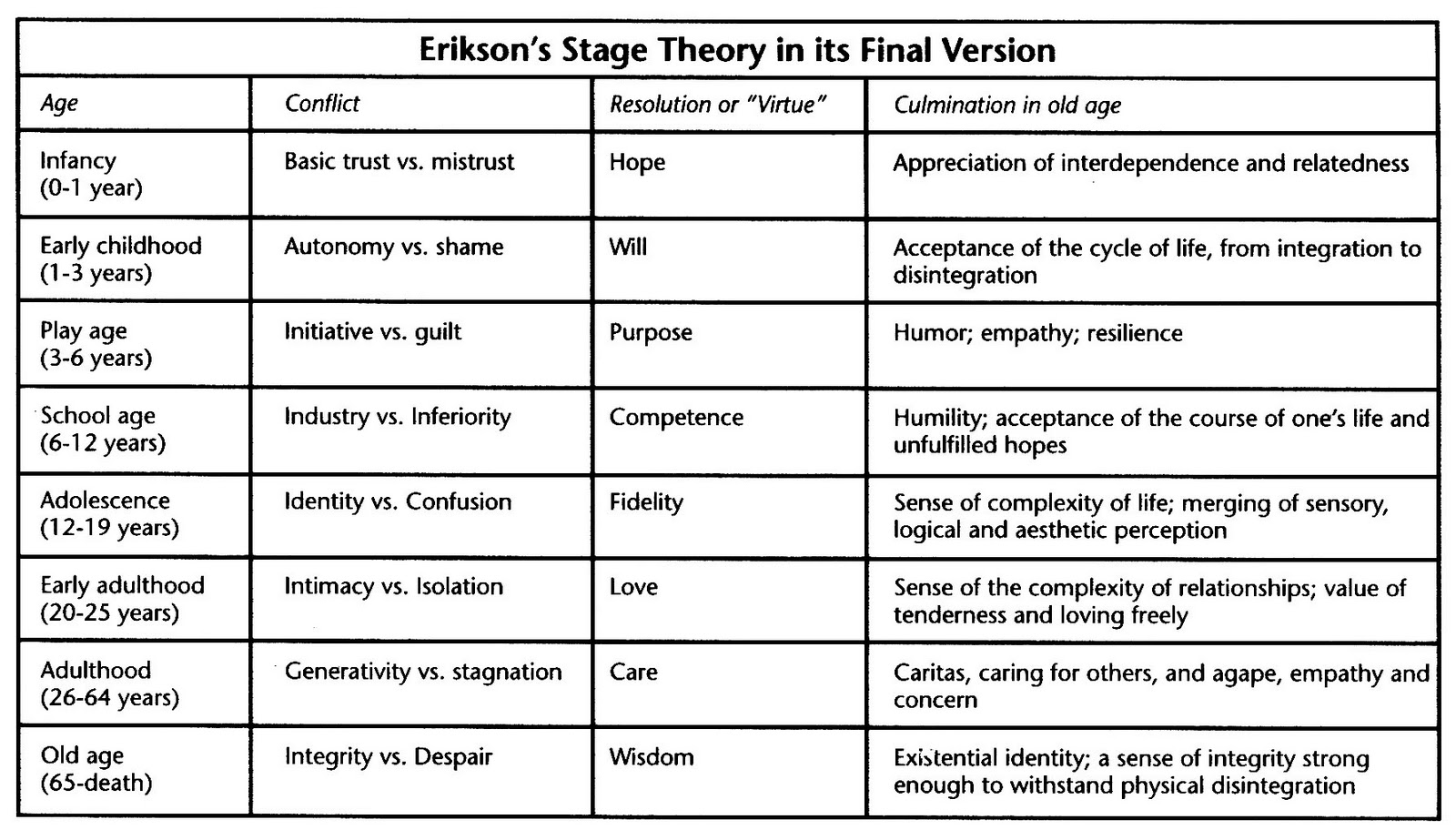Erik Erikson, a renowned psychologist, introduced a theory that has become fundamental in understanding human development. His theory, known as Erikson's stages of psychosocial development, outlines eight distinct stages through which individuals progress throughout their lives. Each stage is characterized by a specific conflict that acts as a turning point, influencing personality development and personal growth. In 2024, the relevance of Erikson's stages continues to be significant, providing insights for educators, psychologists, and individuals striving to understand their own life journeys.
The Foundation of Erikson's Theory
Erikson's theory is rooted in the belief that human development is a continuous process that extends from infancy to old age. Unlike Freud, who emphasized psychosexual stages, Erikson focused on psychosocial development. Each of the eight stages presents a crisis or conflict that must be resolved for healthy psychological development. These conflicts are influenced by social and cultural factors, making Erikson's theory particularly relevant in today's diverse world. As society evolves, the challenges and expectations faced at each stage may shift, but the underlying principles of Erikson's theory remain applicable.
Stage 1: Trust vs. Mistrust
The first stage, trust versus mistrust, occurs from birth to approximately 18 months of age. During this period, infants depend entirely on caregivers for sustenance, comfort, and security. The primary conflict involves developing a sense of trust when caregivers provide reliable care and affection. A successful resolution leads to the infant feeling safe and secure in the world. Conversely, inconsistent or neglectful care can result in mistrust, potentially impacting future relationships. In 2024, understanding this stage can guide parents and caregivers in fostering environments that support healthy trust development in infants.
Stage 2: Autonomy vs. Shame and Doubt
Between ages 18 months and three years, children enter the stage of autonomy versus shame and doubt. This period is marked by toddlers striving for independence, learning to walk, talk, and explore their surroundings. The conflict centers around children's ability to assert their autonomy without feeling shame or doubt about their actions. Supportive parenting that encourages exploration and self-sufficiency while setting appropriate boundaries can lead to a sense of autonomy. Conversely, overly restrictive or critical parenting can result in children feeling shameful or doubtful about their abilities.
Stage 3: Initiative vs. Guilt
The initiative versus guilt stage spans ages three to six years, a time when children begin to assert control and power over their environment through social interactions and play. The central conflict involves balancing the desire to take initiative with the need to avoid feelings of guilt for overstepping boundaries. Children who are encouraged to take initiative and engage in creative activities develop a sense of purpose. However, if their initiatives are met with criticism or control, they may experience guilt, hindering their ability to lead and make decisions.
Stage 4: Industry vs. Inferiority
From ages six to twelve, children enter the industry versus inferiority stage, coinciding with their early school years. During this stage, children develop a sense of competence and achievement through academic and social endeavors. Successfully resolving this conflict involves children feeling industrious and capable, leading to a sense of pride in their accomplishments. However, repeated failures or lack of encouragement can result in feelings of inferiority. In 2024, educators play a crucial role in fostering environments where children can experience success and build confidence.
Stage 5: Identity vs. Role Confusion
Adolescence, from ages 12 to 18, is characterized by the identity versus role confusion stage. This period involves exploring personal identity, beliefs, and goals. Adolescents experiment with different roles and ideas, striving to form a cohesive self-identity. Successfully resolving this conflict leads to a strong sense of identity and purpose. However, failure to establish a clear identity can result in role confusion and uncertainty about one's place in the world. As the world continues to evolve, supporting adolescents in their identity exploration remains a critical task for parents, educators, and society.
Stage 6: Intimacy vs. Isolation
Young adulthood, from ages 18 to 40, involves the stage of intimacy versus isolation. During this time, individuals seek to form intimate, loving relationships with others. The central conflict revolves around the ability to establish deep connections while maintaining a sense of self. Successful resolution leads to strong, fulfilling relationships and a sense of companionship. Conversely, failure to form these bonds can result in isolation and loneliness. In 2024, the importance of fostering meaningful connections is emphasized, as social dynamics and communication methods continue to evolve.
Stage 7: Generativity vs. Stagnation
During middle adulthood, from ages 40 to 65, individuals face the conflict of generativity versus stagnation. This stage involves contributing to society and helping to guide future generations. The focus is on leaving a legacy through work, family, and community involvement. Successfully resolving this conflict leads to a sense of generativity and accomplishment. However, failure to find a sense of purpose can result in stagnation, characterized by feelings of unproductiveness. In 2024, as people live longer and redefine midlife, finding meaningful ways to contribute remains a vital part of personal fulfillment.
Stage 8: Integrity vs. Despair
The final stage, integrity versus despair, occurs in late adulthood, from age 65 onwards. This stage involves reflecting on one's life and accomplishments. The central conflict is between achieving a sense of integrity and fulfillment or experiencing despair over unachieved goals. Successful resolution results in wisdom and acceptance of one's life as meaningful. Conversely, unresolved conflicts and regrets can lead to despair and a fear of death. In 2024, as more individuals reach advanced ages, understanding and supporting the resolution of this stage is crucial for promoting well-being and contentment in later life.
You Might Also Like
Understanding The Allies Of World War II: A Comprehensive GuideThe Iconic Nike Symbol: Evolution, Significance, And Influence In 2024
Understanding Agility: A Comprehensive Guide For 2024
Exploring The World Of ALT SGPT: A Comprehensive Guide For 2024
Jamie Spears: A Comprehensive Insight Into His Life And Legacy
Article Recommendations
- Top Megan Fox Pics Unforgettable Looks
- Intriguing Facts How Tall Is Dominic Monaghan
- Blondies Cookies Net Worth A Detailed Look At The Success Behind The Iconic Brand


